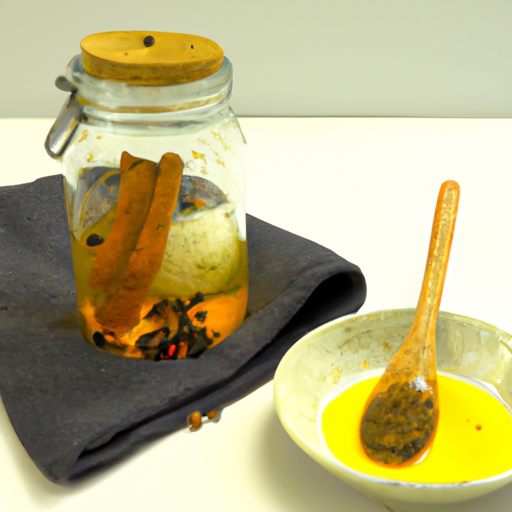Hey there! Are you searching for a nutritious and tasty beverage to incorporate into your daily regimen? Consider trying fermented turmeric tea!
This unique beverage is packed with health benefits and can easily be made at home with just a few simple ingredients. Fermented turmeric tea, also known as ‘golden milk,’ has been used for centuries in traditional medicine to treat a variety of ailments.
It’s rich in antioxidants, anti-inflammatory compounds, and other beneficial nutrients. Plus, it has a warm and comforting taste that’s perfect for sipping on a chilly day.
In this article, I’ll walk you through the step-by-step process of making your own fermented turmeric tea so you can enjoy all its wonderful health benefits from the comfort of your home. Let’s get started!
Key Takeaways
- Fermented turmeric tea is rich in antioxidants and anti-inflammatory compounds, boosts immune function, aids digestion, and improves cognitive function.
- To make fermented turmeric tea, you will need fresh turmeric root, honey, black pepper, filtered water, a mason jar, a wooden spoon, a mesh strainer, and a clean towel.
- The steps to make fermented turmeric tea include mixing the ingredients in a mason jar, covering with a towel, fermenting for 2-3 days, straining and bottling using glass bottles with airtight lids, and refrigerating immediately.
- It is important to limit the fermentation period for a milder flavor, experiment with different herbs or spices, keep brewed tea at room temperature during fermentation, store finished batch in an airtight container in the fridge, and clean tools and work area thoroughly before starting any fermentation process. Additionally, potential side effects of consuming turmeric include digestive issues and allergic reactions, so it is important to start with small amounts and monitor body’s response before increasing intake.
Gather Your Ingredients
Before I get started, I make sure to gather all the necessary ingredients for my fermented turmeric tea. For this recipe, you’ll need fresh turmeric root, honey, black pepper, and filtered water. If you don’t have fresh turmeric root available, you can also use powdered turmeric in a pinch.
There are many variations of turmeric tea, but I prefer the fermented version because it’s packed with probiotics and has a tangy flavor that complements the earthiness of the turmeric. In addition to its delicious taste, there are also numerous benefits of drinking turmeric tea regularly such as reducing inflammation and boosting immune function.
Now that we’ve got everything we need for our tea, let’s move on to preparing our equipment.
Prepare Your Equipment
First things first, grab your gear: a mason jar, a wooden spoon, and a mesh strainer. Don’t forget to also have a clean towel handy for covering the jar during fermentation. Oh, and make sure you’ve got some gloves on to avoid staining your hands!
Before starting the fermentation process, it’s crucial to ensure that all equipment is properly cleaned. You don’t want any unwanted bacteria or mold in your tea.
Here are the required tools you’ll need for preparing your equipment:
- Mason jar – Make sure it’s clean and free of any cracks or chips.
- Wooden spoon – Avoid using metal utensils as they can react with the ingredients.
- Mesh strainer – This will come in handy when straining out the turmeric pulp.
- Clean towel – Use this to cover the jar during fermentation.
With everything in place and cleaned up, it’s time to move on to starting the fermentation process by preparing the tea mixture.
Start the Fermentation Process
Now that your equipment’s prepped and ready, it’s time to get down to business and start fermenting your delicious concoction.
First things first, you need to choose the right turmeric for your tea. Look for fresh turmeric root in your local grocery store or farmers’ market. Make sure it’s firm and free of any soft spots or blemishes. You can also use dried turmeric if fresh isn’t available, but keep in mind that the flavor may be slightly different.
Next, it’s time to start the fermentation process. Cut the turmeric into small pieces and place them in a clean glass jar with a tight-fitting lid. Add filtered water until the jar is about ¾ full and stir well.
Cover with a cheesecloth or coffee filter secured with a rubber band to allow air flow while keeping out insects or debris. Place the jar in a warm spot away from direct sunlight and let it ferment for 2-3 days, depending on how strong you want the flavor of your tea to be.
Now that you’ve successfully started fermenting your turmeric tea, let’s move on to straining and bottling it up!
Strain and Bottle the Tea
Once the fermentation process is complete, it’s time to strain and bottle up your golden elixir, ready for sipping and enjoying at any time of day. Here are my bottling techniques that I find work well:
-
Use glass bottles with airtight lids to store the fermented tea. This will keep the tea fresh for longer periods of time and prevent contamination.
-
Add some flavor variations to your bottled tea by adding sliced ginger, lemon or honey before sealing the bottle. This will give your tea added health benefits as well as enhance its taste.
-
Store your bottled tea in a cool place away from direct sunlight, which can affect its flavor.
After bottling up your turmeric tea using these simple steps, you’ll have a refreshing drink that’s perfect for any occasion.
But before we get into serving it, let’s explore how to properly store this fermented beverage for maximum freshness and flavor retention.
Store the Tea
Now that I’ve successfully fermented and bottled my turmeric tea, it’s important to store it properly to ensure its freshness.
I always make sure to refrigerate my tea immediately after bottling. This helps to slow down the fermentation process and maintain the flavor.
It’s also important to note that homemade fermented tea typically has a shorter shelf life compared to commercially produced ones. So, I make sure to consume it within a reasonable timeframe.
Refrigerate the Tea
When you’re ready to store the fermented turmeric tea, pop it in the fridge to keep it fresh and cool. While there may be alternative storage methods for this tea, refrigeration is highly recommended as it can extend its shelf life and maintain its flavor profile. The cold environment slows down the fermentation process, preventing the growth of harmful bacteria that could spoil the tea.
The benefits of cold storage also include preserving the potency of turmeric’s active ingredient, curcumin. This compound is known for its anti-inflammatory properties and is responsible for many of turmeric’s health benefits. By keeping the tea in the fridge, curcumin degradation can be minimized, allowing you to enjoy these benefits for a longer period.
Now that your tea is properly stored, let’s talk about how long it will last before going bad.
Shelf Life
How long can you enjoy the health benefits of your deliciously brewed turmeric tea before it starts to lose its potency? The shelf life of fermented turmeric tea depends on several factors such as preservation methods and storage conditions. If you store your tea properly, it can last for up to two weeks in the refrigerator.
However, if left at room temperature or exposed to sunlight for extended periods, the tea may go bad before its expiration date. To ensure that your fermented turmeric tea stays fresh and flavorful for longer, consider using airtight containers when storing them in the fridge. Glass jars with tight-fitting lids are ideal since they prevent air exposure and keep out moisture that could cause mold growth.
Additionally, avoid shaking or stirring the tea too much as this may introduce oxygen into the mixture, leading to fermentation issues. Now that you know how to preserve your fermented turmeric tea properly, let’s move on to how you can serve and enjoy it!
Serve and Enjoy
To savor the delicious flavor of your fermented turmeric tea, take a moment to inhale its warm, spicy aroma before taking a sip. You can enjoy it hot or cold, depending on your preference.
To serve it hot, simply heat it up in a pot on the stove or in the microwave. If you prefer it cold, let it chill in the fridge for a few hours before pouring over ice.
For serving suggestions, try adding a slice of lemon or lime for an extra zingy kick. You can also sweeten with honey or agave syrup if you want to balance out the spiciness. For those who like to experiment with different flavors, consider adding other herbs and spices such as ginger or cinnamon to create unique variations of this delicious tea.
With so many options available, you’re sure to find a combination that suits your taste buds perfectly.
Now that you know how to serve and enjoy your fermented turmeric tea, let’s move on to discuss its amazing health benefits!
Health Benefits
Experience the incredible health benefits of this spicy drink and feel your body thrive with each sip. Fermented turmeric tea is not only a delicious and refreshing beverage, but it also comes loaded with numerous health advantages.
Here are just a few reasons why you should consider incorporating fermented turmeric tea into your diet:
- Boosts immunity: The antioxidants present in turmeric help fight off infections and diseases, strengthening the immune system.
- Reduces inflammation: Turmeric contains anti-inflammatory compounds that can aid in reducing swelling, joint pain, and stiffness.
- Aids digestion: Fermented foods are known to promote gut health by supplying beneficial bacteria to the digestive tract. This can help alleviate issues such as bloating, constipation, and diarrhea.
- Improves cognitive function: Studies have shown that curcumin, the active ingredient in turmeric supplements, may enhance brain function and improve memory retention.
- May prevent cancer: The anti-inflammatory properties of turmeric have been linked to preventing certain types of cancers.
Incorporating fermented turmeric tea into your daily routine is an easy way to reap these benefits while enjoying a delicious beverage. However, it’s important to note that there may be potential side effects associated with consuming large amounts of turmeric or taking supplements regularly.
Potential Side Effects
Although fermented turmeric tea has numerous health benefits, it’s essential to be aware of potential side effects such as digestive issues or allergic reactions. Some individuals may experience stomach upset after consuming fermented turmeric tea, especially if they have a sensitive digestive system.
Moreover, some people may develop an allergic reaction to turmeric, which can lead to symptoms like hives, swelling, and difficulty breathing. It’s important to note that while these side effects are possible, they are relatively rare.
Most people can enjoy fermented turmeric tea without experiencing any adverse effects. However, if you’re new to drinking this type of tea or have a history of allergies or digestive issues, it’s best to start with small amounts and monitor your body’s response before increasing your intake.
With that said, let’s move on to some tips and tricks for making the perfect cup of fermented turmeric tea!
Tips and Tricks
When brewing your cup of this delicious and healthy fermented turmeric tea, there are a few tips and tricks that I’ve learned along the way. These simple techniques can make all the difference in the taste and quality of your brew. Here are some helpful tips to keep in mind when making fermented turmeric tea:
- The longer you ferment your tea, the tangier it will become. If you prefer a milder flavor, then limit the fermentation period to 24-48 hours.
- You can experiment with different herbs or spices to add an extra kick to your tea. Try adding ginger or lemongrass for a refreshing twist.
- Keep your brewed tea at room temperature during fermentation as high temperatures may kill off beneficial bacteria.
- Store your finished batch in an airtight container in the fridge to slow down further fermentation and preserve freshness.
- Always clean your tools and work area thoroughly before starting any fermentation process.
By keeping these tips in mind, you’ll be able to enjoy a perfectly crafted cup of fermented turmeric tea every time.
Frequently Asked Questions
How long does fermented turmeric tea last once it is bottled and stored?
Once fermented turmeric tea is bottled and stored, it can last for up to six months in the fridge. To ensure longevity, store the tea in an airtight container and keep it away from direct sunlight.
Can I add honey or other sweeteners to the tea during or after the fermentation process?
Did you know that adding sweeteners to fermented turmeric tea can extend its shelf life? However, it’s best to add them after the fermentation process is complete. This ensures that the beneficial bacteria in the tea are not disrupted during fermentation.
Is it necessary to use organic turmeric root for this recipe?
Using organic turmeric root is ideal for making turmeric tea as it ensures that the tea is free from harmful chemicals. Additionally, organic turmeric contains higher levels of beneficial compounds, providing more health benefits to the body.
Can I reuse the turmeric root or starter culture for subsequent batches of fermented turmeric tea?
Yes, I can reuse the turmeric root and starter culture for subsequent batches of fermented turmeric tea. However, it’s important to note that different fermentation methods may require different amounts or preparations of these ingredients.
Is it safe to consume fermented turmeric tea if I have a history of digestive issues or a compromised immune system?
As someone with digestive concerns and compromised immune health, I was hesitant to try fermented turmeric tea. However, after researching its benefits as an alternative remedy, I found it safe and soothing for my symptoms.
Conclusion
So there you have it, a simple and easy-to-follow recipe for making fermented turmeric tea. With just a few ingredients and some patience, you can create a delicious and healthy beverage that’s packed with antioxidants and anti-inflammatory properties.
I know some people may be hesitant to try this recipe because of the fermentation process, but don’t let that scare you off. Fermentation is actually a natural process that’s been used for thousands of years to preserve food and enhance its flavor. Plus, once you taste the tangy, slightly effervescent flavor of your homemade turmeric tea, I’m sure any fears will melt away.
To help visualize the ideas presented in this article, think of the fermentation process as similar to brewing beer or making yogurt. Just like those processes require time and careful temperature control to achieve the desired outcome, so does fermenting turmeric tea.
But once you get the hang of it, you’ll have a delicious drink that not only tastes great but also provides numerous health benefits. So give it a try today!










